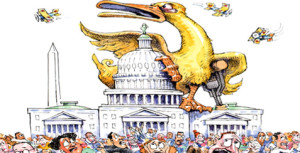An acquaintance of mine asked an interesting question regarding President Obama’s upcoming battle over how he intends to fill a key vacancy on the U.S. Supreme Court.
He wondered how one should define the term “lame duck”?
His understanding of the term meant that an officeholder became a lame duck when his or her successor in office had been determined.
Here’s how the American Heritage Dictionary defines the term: “An elected officeholder continuing in office during the period between and election and inauguration of a successor.”
My reaction was that the definition of the term has become a bit more “fluid” these days.
Senate Republicans say they don’t want Obama to fill the vacancy created by the death of Supreme Court Justice Antonin Scalia because he’s a “lame duck” president. They want the next president to make the call.
I tend to have a broader view of the term “lame duck.” I suppose one could argue that any president who wins a second term becomes a lame duck the moment the election returns are finalized. The Constitution prohibits the president from running again, so the clock begins ticking on the president’s term. If that reasoning holds up, then the American Heritage dictionary definition could be interpreted as being germane.
Whatever the case, or however one defines the term, there remains an indisputable truth. The president is in office until the very moment the successor takes the oath of office.
Therefore, the president is entitled — lame duck or not — to all the perks, privileges and power that the office commands.
President Obama is entitled to appoint someone to fill the late Justice Scalia’s seat on the Supreme Court. The Senate, thus, is entitled — and obligated, in my view — to consider that appointment in a timely manner and then vote on whether to approve it.
The president’s lame-duck status should not be an issue.
But it has become one, thanks to the obstructionists who are now in charge of the U.S. Senate.
